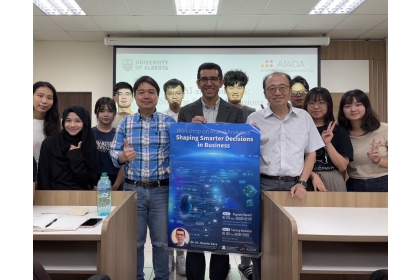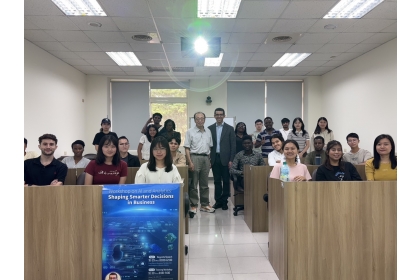AI Research Expert from University of Alberta Delivers Keynote at NCHU Exploring the Latest Applications of Artificial Intelligence in Decision Analytics
2025-10-03
興新聞張貼者
Unit秘書室
165
At the invitation of the Research Center for Humanities and Social Sciences (RCHSS) and Professor Tzong-Ru Lee from the Department of Marketing at National Chung Hsing University (NCHU), Professor M. Hosein Zare from the AI Centre for Decision Analytics at the University of Alberta, Canada, visited the university on September 29–30 to deliver a keynote lecture titled "From Data to Decisions: The Role of AI and Analytics in Decision Making." The event attracted a large audience of faculty, students, and industry professionals, filling the venue to capacity.
Professor Zare emphasized that with globalization, sustainability pressures, and the explosion of big data, modern businesses face increasingly difficult challenges in decision-making. These challenges involve not only substantial financial, social, and reputational risks but also the three critical factors of complexity, uncertainty, and speed. He underscored that analytics, artificial intelligence (AI), and machine learning (ML) are complementary tools that can transform massive datasets into insights, thereby enhancing decision quality.
Sharing practical case studies, Professor Zare showcased how AI and data analytics are improving decision-making in Alberta’s healthcare, agriculture, and energy sectors. He noted that the province has long struggled with lengthy emergency room wait times; through descriptive and predictive analytics, hospitals can identify bottlenecks, allocate resources more effectively, reduce patient wait times, and improve quality of care. In agriculture, he highlighted the use of satellite imagery combined with machine learning models to forecast wheat yields with greater accuracy, enabling both government and farmers to anticipate climate risks in advance and safeguard food security and market stability.
Turning to the energy industry, Professor Zare examined the complex decision-making scenarios in Alberta’s oil sands sector amid global oil price volatility, environmental regulations, and transportation constraints. He demonstrated how optimization models can be applied to supply chain management, helping companies maximize efficiency under multiple constraints. He also shared research on food waste reduction, proposing an innovative model that integrates AI with delivery platforms to strike a balance between minimizing waste and increasing profitability.
Professor Lee remarked that this lecture not only gave NCHU students and faculty a deeper understanding of how AI and analytics create value across diverse fields but also highlighted the university’s strong commitment to fostering international academic exchange and interdisciplinary collaboration. Moving forward, NCHU will continue to invite leading international scholars to campus, further strengthening research capacity in artificial intelligence, sustainability, and industry applications.
Professor Zare emphasized that with globalization, sustainability pressures, and the explosion of big data, modern businesses face increasingly difficult challenges in decision-making. These challenges involve not only substantial financial, social, and reputational risks but also the three critical factors of complexity, uncertainty, and speed. He underscored that analytics, artificial intelligence (AI), and machine learning (ML) are complementary tools that can transform massive datasets into insights, thereby enhancing decision quality.
Sharing practical case studies, Professor Zare showcased how AI and data analytics are improving decision-making in Alberta’s healthcare, agriculture, and energy sectors. He noted that the province has long struggled with lengthy emergency room wait times; through descriptive and predictive analytics, hospitals can identify bottlenecks, allocate resources more effectively, reduce patient wait times, and improve quality of care. In agriculture, he highlighted the use of satellite imagery combined with machine learning models to forecast wheat yields with greater accuracy, enabling both government and farmers to anticipate climate risks in advance and safeguard food security and market stability.
Turning to the energy industry, Professor Zare examined the complex decision-making scenarios in Alberta’s oil sands sector amid global oil price volatility, environmental regulations, and transportation constraints. He demonstrated how optimization models can be applied to supply chain management, helping companies maximize efficiency under multiple constraints. He also shared research on food waste reduction, proposing an innovative model that integrates AI with delivery platforms to strike a balance between minimizing waste and increasing profitability.
Professor Lee remarked that this lecture not only gave NCHU students and faculty a deeper understanding of how AI and analytics create value across diverse fields but also highlighted the university’s strong commitment to fostering international academic exchange and interdisciplinary collaboration. Moving forward, NCHU will continue to invite leading international scholars to campus, further strengthening research capacity in artificial intelligence, sustainability, and industry applications.



